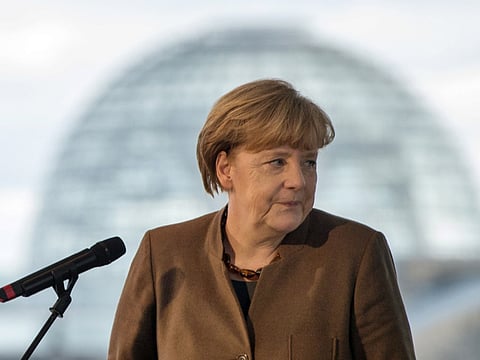Germans’ refugee response puts US to shame
Obama is pro-immigration, yet his moral leadership is limited by his Republican opponents

The political controversy over the proposed resettlement of 10,000 Syrian refugees in the US next year imperils the superpower’s claim to global moral leadership. Unlike their counterparts in some European nations, the more compassionate politicians in the US appear powerless to do more for people fleeing war and terror.
Syria is the biggest source of refugees: According to the United Nations, more than four million people have fled and more than seven million are displaced internally. The US took in 69,933 refugees in fiscal year 2015, which ended in September; only about 1,800 were Syrians.
These numbers are for the US resettlement programme, which plucks people from UN-monitored refugee camps. Usually, the most vulnerable are selected — women, children, people targeted for political persecution or those with life-threatening diseases. A few Syrians may be trickling into the US on their own as asylum-seekers, but those numbers probably are tiny: You can’t cross the Atlantic on a leaky raft.
Geography has made the refugees a European problem, and in recent months, thanks to Chancellor Angela Merkel, mainly a German one. The refugees already had arrived uninvited at the European Union’s doorstep. Germany didn’t have a resettlement programme, and in general was less generous toward refugees. But it ended up doing much more for them than the US.
According to statistics for October from the German Federal Department for Migration and Refugees, Syrians filed 103,708 asylum applications in 2015. Of those, more than 57,000 have already been accepted, so will most of the rest: The success rate among Syrians is 93.2 per cent. This year, Germany will probably take in more Syrians than the US refugee total, even though it has a population one-quarter the size. Besides, Germany has to house hundreds of thousands of asylum-seekers — more than 700,000 so far this year — and pay them a stipend of ₣143 ($152) for basic needs.
Perhaps fittingly, buildings at the abandoned Tempelhof Airport, which was used in the historic airlift to West Berlin during the Soviet blockade in 1948-1949, are now filled with asylum-seekers, mostly from Syria.
On Monday, 23 US governors said they would refuse to accept Syrian refugees in their states. There also were calls to deport the Syrians already in the US, along with more screening for the 10,000 the administration wants to accept, and even for religious tests to differentiate Christians from Muslims.
In Germany, a politician who made any of these requests would be exiled to the political fringe. No German state — which have some autonomy, but fewer powers than US states — has attempted to keep asylum-seekers out, even though they are unpopular in parts of the east. Even Bavaria, where the government is in favour of sharply limiting the influx of refugees and Prime Minister Horst Seehofer has been a leading critic of Merkel’s open-door policy, has been doing its best to help the federal effort succeed.
The enthusiasm of Germans for helping refugees has waned since the summer. Alternative fuer Deutschland, the only vocally anti-immigrant party, apart from some unelectable far-right groups, is now third in the polls after the two parties that make up the ruling coalition, Merkel’s CDU and the Social Democrats. AFD only polls 10.5 per cent, though.
Seehofer and his allies have renewed calls for a nationwide quota on refugees, though Merkel has refused to consider the idea. She reiterated her opposition after the Paris attack. “Everyone who comes,” she said, “has a reason to flee”. Even so, her party still confidently tops the polls, though it has lost a few points since the summer.
Obama is pro-immigration. Yet his moral leadership is limited by his Republican opponents, who claim to put security ahead of humanitarian values. Merkel, a reluctant global leader, has been thrust into the role of the world’s foremost defender of these values. That probably won’t shield Germany from the terrorist threat, but then treating refugees as if they posed a mortal threat or even restricting all immigration wouldn’t make it safe, either.
— Washington Post


